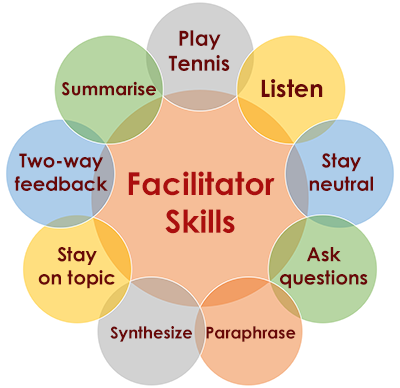 One of the most important skills for a teacher of Development Education and students wishing to engage in active citizenship, is facilitation. Educators are facilitators of learning and active citizens often find themselves facilitating and/or joining with others to facilitate a process of change. Facilitation is a way of working with people which enables and empowers them to process their thinking and accomplish their goals. The facilitator does not perform the task, but uses certain skills in a process which allows the individuals/group reach their decision/set their goal/learn a skill.
One of the most important skills for a teacher of Development Education and students wishing to engage in active citizenship, is facilitation. Educators are facilitators of learning and active citizens often find themselves facilitating and/or joining with others to facilitate a process of change. Facilitation is a way of working with people which enables and empowers them to process their thinking and accomplish their goals. The facilitator does not perform the task, but uses certain skills in a process which allows the individuals/group reach their decision/set their goal/learn a skill.
Facilitation is a developmental educational method which encourages people to share ideas, resources, opinions and to think critically in order to identify needs and find effective ways of satisfying those needs. It is a method that can be used in many settings. Although it is usually used with groups of people, individuals can be facilitated too.
The following is a helpful resource:
https://www.academia.edu/37232772/Developing_Facilitation_Skills_A_Handbook_for_Group_Facilitators
This resource makes that point that facilitation encourages greater participation and responsibility for decisions. Through facilitation, group members come to value and develop their own expertise and skills. Facilitation involves many facets of interaction between individuals, such as clarification, conflict management and planning. It can be learned and developed through practice and supervision. An openness to constant learning and development is necessary for anyone seeking to improve their facilitation skills.
Some points made in this resource are:
- A facilitator helps people to decide what they want to accomplish, reminds them of their responsibility in achieving it, and encourages and helps them to complete an agreed task or activity.
- The facilitator ensures that the needs of individuals within the group are recognised, acknowledged and responded to; this is seen as an integral part of the task at hand and not superfluous to it.
- In some settings the facilitator plays an objective role, asking questions, encouraging responses and enabling group members to discuss, to respond and to reach a conclusion. In other situations, s/he may be stimulating group members to create solutions to problems they have identified by offering suggestions or creating simulations which the group can practise.
- In facilitation there is an equal emphasis on achieving the task and on the process involved in that achievement. Group members work together towards a defined end/goal and, at the same time, focus on how they are working together to ensure the development and support of each other within the group and throughout the process.
- Inherent in facilitation are the principles of equality, inclusion, participation and affirmation. In group terms this means recognising the value of each person’s contribution, encouraging the active participation of each group member in identifying and utilising her/his skills, experience, creativity and analysis. This understanding and sharing of skills enables individuals and groups to plan for development and change.
- Facilitation is influenced by principles which support the view that people should be actively involved in determining their own lives, and that in this way a more equal society can be created.
- Facilitation has been accepted as a good practice to be adopted and used in the area of personal, group, organisational and social development as well as in the voluntary and community sector.
